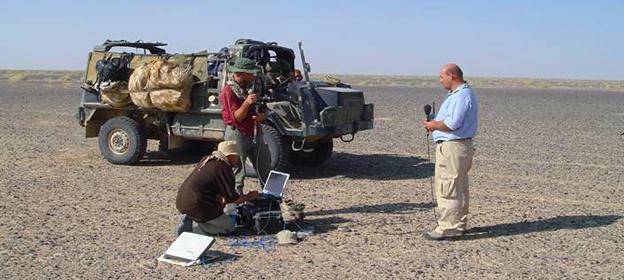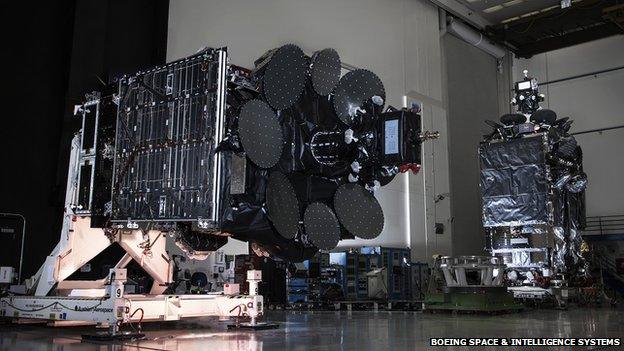Inmarsat begins Global Xpress rollout
- Published

The Proton rocket carrying the first Inmarsat I-5 spacecraft leaves the misty Baikonur pad
The rollout has begun for Britain's single biggest commercial space project.
The London-based Inmarsat company has launched the first spacecraft in what will be a new global telecommunications network for its on-the-move customers.
Inmarsat plans to launch up to three further spacecraft in its Ka-band Global Xpress (GX) system, representing an investment of £1bn ($1.6bn).
The initial I-5 F1 satellite was launched from Baikonur in Kazakhstan.
Its Proton rocket left the pad at 18:12 local time (12:12 GMT) on Sunday for a flight that lasted over 15 hours.
Separation from the Proton's Breeze-M upper-stage on Monday (GMT) put the I-5 in a supersynchronous transfer orbit that runs out to 65,000km above the planet.
The Boeing-built, 6.1-tonne satellite must now use its own chemical and electric propulsion system to circularise this trajectory and move itself into a "stationary" position at 63 degrees East, some 36,000km above the Indian Ocean.
Inmarsat has become the dominant force in the so-called Mobile Satellite Services (MSS) market.
Its principal customer base is the shipping sector, but the company also caters for any groups that need connectivity away from a fixed line. These include oil and gas installations, the aviation sector, armed forces, aid agencies and NGOs in disaster areas, and TV news crews reporting from trouble zones.
Customers can use Inmarsat services to make phone calls, to transfer audio-visual material or simple data.

A BBC correspondent prepares for a live video report over satellite
Traditionally, the company has served these customers using the L-band part of the radio spectrum. However, the new GX constellation will operate in the higher-frequency Ka-band, enabling much higher bandwidth connections - up to 50Mbps download, and 5Mbps upload.
"When we started thinking about this project five years ago, we'd come to the conclusion that you could not grow much further the L-band franchise - not in terms of revenue, but in terms of capacity," explained Ruy Pinto, Inmarsat's chief technical officer.
"We have hit the limits of all-you-can-eat high-data-rate packages in L-band; there simply isn't enough spectrum. Ka is the natural next step to deliver the types of packages our customers want," he told BBC News.
The I-5 satellites will not replace the existing Inmarsat L-band spacecraft; rather, they will augment them, and hopefully also drive new types of services.
Although Ka will accommodate higher data rates, its signals can become degraded in poor weather, and Inmarsat plans to switch customers seamlessly between the bands if some locations on the globe are experiencing particular difficulties.
"The physics of Ka allows higher throughput. It has had a vulnerability in the past because of its susceptibility to 'rain fade', to bad weather, but technology has largely taken care of this problem," added Inmarsat's Michele Franci.
"And for the maritime sector, where you might experience extreme weather, we offer a service onboard the ship where you have a router that is connected to the network management system and chooses Ka or L-band depending on the strength of the signal."

A total of four I-5s have been ordered from the Boeing manufacturer
One key and fast-growing market likely to benefit from the introduction of the Global Xpress system is the aviation sector.
Inmarsat already provides mobile connectivity to enable airlines to offer on-board wifi for passengers. Ka should mean those passengers can do more on their laptops, tablets and smartphones while in the air.
Of all Inmarsat's revenue streams, this one is currently growing fastest - in double digits.
Three satellites, separated from each other by roughly 120 degrees, are required to complete the GX network. Inmarsat will launch the I-5 F2 and F3 models next year, with the aim of having 90% of services up and running by the end of 2014.
The company has also exercised an option to buy a fourth spacecraft from Boeing.
This additional platform will initially provide insurance against any failure in the first three, be that a loss on launch or a major malfunction in orbit. But the intention is certainly to put it in orbit at some point.
Richard Roithner from the space consultancy Euroconsult said the GX rollout was a big moment for Inmarsat.
He told the BBC: "With this trend towards the higher data-rate needs of customers, Inmarsat has increasingly faced competition from Fixed Satellite Service operators, such as Intelsat and SES with what is called VSAT in the Ku and C-band. This has taken away some high-end customers.
"These operators are all now thinking about their next-generation, high-throughput systems. And in the future, Intelsat will probably be the main competition with a system called Epic," he said.

Inmarsat began life as a not-for-profit organisation, but is now the world's biggest commercial MSS provider
Jonathan.Amos-INTERNET@bbc.co.uk and follow me on Twitter: @BBCAmos, external
- Published25 July 2013
- Published23 July 2013
- Published9 November 2012
- Published14 May 2012